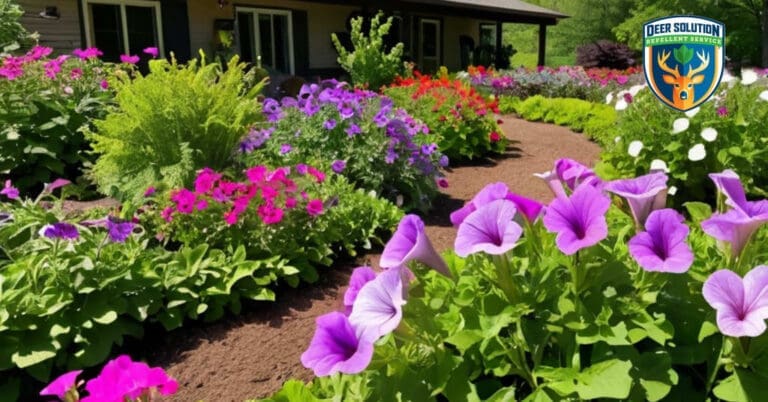Gardening can be as rewarding as it is challenging, especially when local wildlife takes an interest in your flowers. Petunias (Petunia spp.), with their delicate blooms and vibrant colors, are a favorite for gardeners. But their appeal can also attract unwelcome visitors—like deer. Let’s explore how to keep your garden flourishing while understanding the relationship between petunias and deer.
The Role of Petunias in a Pollinator-Friendly Garden
Beyond their beauty, petunias contribute significantly to garden ecosystems. Their trumpet-shaped flowers are particularly attractive to pollinators like hummingbirds, bumblebees, and butterflies. These visitors play a vital role in maintaining biodiversity while enhancing the health of surrounding plants. By cultivating petunias, gardeners not only create visual appeal but also support local wildlife, making these flowers a cornerstone of a thriving garden.
When Are Petunias at Risk from Deer?
Deer are opportunistic feeders, and their dietary preferences often shift with seasonal changes. During early spring, tender new petunia growth may become an enticing snack, especially when other vegetation is scarce. Similarly, harsh winters can drive deer to explore a wider range of plants, including petunias. Recognizing these seasonal risks allows gardeners to take proactive measures, such as using barriers or repositioning vulnerable plants during high-risk periods.
Creative Ways to Incorporate Petunias
Petunias are incredibly versatile, fitting seamlessly into various garden styles. Consider these design ideas to showcase their beauty while minimizing deer interaction:
- Vertical Gardens: Use cascading varieties of petunias in hanging baskets or wall planters to elevate their display and keep them out of reach of deer.
- Mediterranean Themes: Pair petunias with drought-tolerant plants like lavender and Russian sage for a bold, structured look. These aromatic companions also help deter deer.
- Mixed Beds: Combine petunias with spiky or textured plants such as ornamental grasses or dusty millers. The contrasting textures create visual interest and can discourage deer browsing.
Building Garden Resilience
Healthy plants are naturally more resistant to stressors like wildlife browsing. Ensure your petunias thrive by incorporating regular care practices:
- Use Organic Mulch: Mulching helps retain soil moisture, promotes plant health, and masks the scent of delicate blooms, making them less noticeable to deer.
- Prune Strategically: Regularly deadhead petunias to encourage growth and prevent them from becoming easy targets for deer during vulnerable stages.
- Companion Planting: Surround petunias with strongly scented herbs like thyme or rosemary to create a natural deterrent barrier.
Sustainable Solutions for Garden Protection
Eco-friendly practices can help balance garden protection with environmental stewardship. Adopting methods such as using all-natural repellents and reducing chemical inputs ensures a healthier landscape for plants and pollinators alike. Additionally, focusing on native plants alongside petunias can create a resilient garden that supports local ecosystems while discouraging excessive deer browsing.
Expert Support for a Flourishing Garden
Managing deer activity in your garden can be challenging, but professional guidance offers tailored solutions. Deer Solution specializes in eco-conscious strategies designed to protect plants like petunias while preserving your garden’s ecological balance. Their expertise in natural repellents and sustainable practices can help you enjoy vibrant blooms year-round with minimal disruption.
Petunias bring charm and vitality to any garden, but deer interactions can sometimes threaten their beauty. By embracing thoughtful design, seasonal awareness, and sustainable gardening practices, you can safeguard these beloved flowers. With the right strategies—and expert support where needed—your petunias can thrive as part of a vibrant, resilient landscape.








